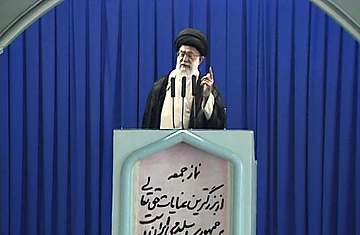
Iran's Supreme Leader Ayatullah Ali Khamenei gives his Friday Prayer sermon at Tehran University in this video grab on June 19, 2009
Friday's weekly Friday prayer service at Tehran University will have done a lot more than honor the onset of the Muslim sabbath. The country's Supreme Leader, Ayatullah Ali Khamenei, led the service himself and called for "peace and tranquility" and an end to the mass protests. He made his remarks in front of many thousands of people either in the campus or lining the surrounding streets in his first public address since the outcome of last Friday's disputed presidential election. He insisted there had been no fraud in the result, describing President Mahmoud Ahmadinejad's election win as "definitive." He added that the "Islamic establishment would never manipulate votes and commit treason. The legal structure in this country does not allow vote-rigging. If the difference was 100,000 or 500,000 or 1 million, well, one may say fraud could have happened. But how can one rig 11 million votes?" For Khamenei, the election was proof positive that democracy in Iran was there for the world to see because, if the Iranian people had not felt free, they wouldn't have gone to the polls in such numbers (he referred to the 85% turnout as a "great accomplishment.")
The Supreme Leader spoke for the best part of 100 minutes, offering no concessions whatsoever to protesters demanding that the vote be held again. He went on to say that the demonstrations should cease with protesters being "held responsible for chaos if they didn't end" and that a "street challenge is not acceptable." But Khamenei didn't just reserve his remarks for the Iranians. He called the British government "the most evil opponent" (The U.K. government has since summoned the Iranian ambassador to protest against the comment) and blamed external "enemies of Islam" for trying to stoke anger. "Some of our enemies in different parts of the world intended to depict this absolute victory, this definitive victory, as a doubtful victory," Khamenei said. "It is your victory. They cannot manipulate it." The Supreme Leader's forceful points were heeded by some in the crowd who could be heard chanting "Allah is Great," "Death to Israel," "Death to America," "Death to Britain."
Khamenei affirmed his support for Ahmadinejad, saying the President's views on foreign affairs and social issues were close to his own. He also accused the other candidates of insulting Ahmadinejad before the election. "They swore and called the president superstitious and called him names, which is embarrassing. They forgot about morality and law," he said.
Khamenei had publicly requested the attendance of all the main players in the political drama that has roiled Iran since the disputed election. Reports on Thursday suggested that opposition presidential candidate Mir-Hossein Mousavi encouraged his supporters to attend the event, but overnight word circulated that he and reformist candidate Mehdi Karroubi had urged their followers to stay away, although the authenticity of those claims could not be verified. Indeed, the latest reports confirm that Mousavi and Karroubi were themselves conspicuous by their absence from Friday's prayers. Ahmadinejad, however, was in attendance as was fellow politician Mohsen Rezaie. It's thought that the basij militia loyal to Ahmadinejad — who have been at the forefront of brutal attacks on opposition supporters — were there in force. While this created a potentially volatile security situation — just a gathering of hundreds of thousands of people, divided by political faction and stoked by a week of fervor — it also squeezes Mousavi and other opposition leaders politically. Khamenei didn't invite them to prayers to demonstrate their piety; he demanded a symbolic show of loyalty to the Islamic Republic itself, and its founding principle of giving ultimate political authority to its clerical Supreme Leader.
The government has already declared the opposition's protest marches illegal, and in a Wednesday meeting with opposition candidates, Khamenei urged them to "dissociate themselves from rioters" and pursue their complaints about the election results by petitioning the various appointed councils of the regime. But for Mousavi, heeding the Supreme Leader's call to take his supporters off the streets — and rely only on clerical bodies loyal to Khamenei to sort through a contested election — would be to surrender his trump card: it is the street protests that have caused Khamenei to hesitate after doing his utmost to get his ally Ahmadinejad elected. If Mousavi doesn't take his supporters off the streets, Khamenei could well unleash the security forces on what will be deemed a threat to the Republic.
Whether or not they attended the prayer service, Mousavi's supporters were planning to hold their own rally in Tehran on Saturday. The Supreme Leader's sermon may now contain important clues as to how the basij and other security forces will respond. The opposition candidate's supporters inside the regime are also working hard to reinforce his case for reversing last Friday's announcement. The combination of pressure on the streets and in the corridors of power has already compelled Khamenei to reverse his initial proclamations and order a recount of the vote.
The Supreme Leader may in fact be under competing pressures. The Assembly of Experts, the body of clerics that appoints — and can remove him — is chaired by Mousavi supporter Hashemi Rafsanjani, who is reportedly lobbying the body to intervene. But Khamenei has also thrown in his lot with Ahmadinejad and his supporters in the security forces, who may be in a hurry to bring to an end to the challenge to his second term in office. So Khamenei must hope that he's found a way to lean on the opposition candidates to rein in their supporters, while not being seen to be abusing his authority to enforce an election result deemed fraudulent by many millions of Iranians.
Not your average Friday prayer service at Tehran University, then.
